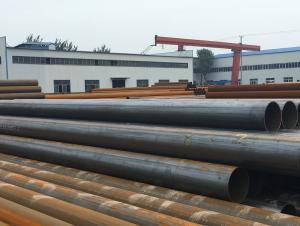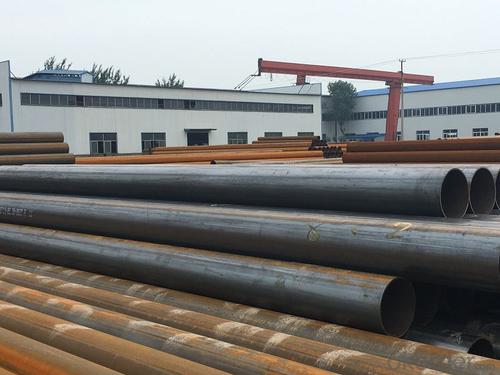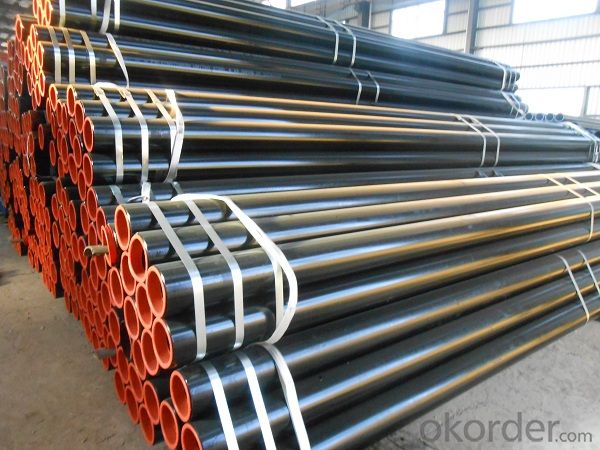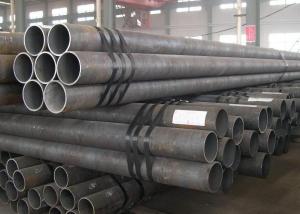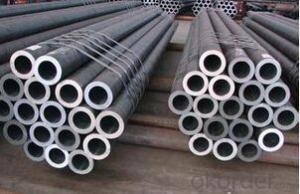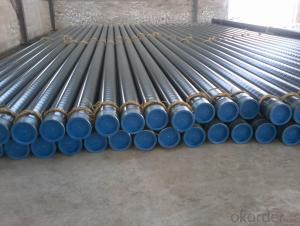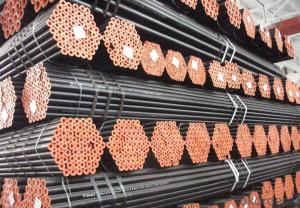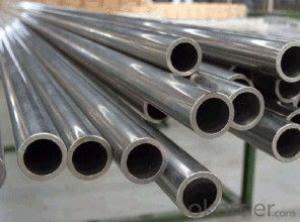Low carbon seamless steel pipe for boiler
- Loading Port:
- Tianjin
- Payment Terms:
- TT or LC
- Min Order Qty:
- 35 m.t.
- Supply Capability:
- 16000 m.t./month
OKorder Service Pledge
OKorder Financial Service
You Might Also Like
1、Structure of Low carbon seamless steel pipe for boiler
Seamless pipe is formed by drawing a solid billet over a piercing rod to create the hollow shell. As the manufacturing process does not include any welding, seamless pipes are perceived to be stronger and more reliable. Historically seamless pipe was regarded as withstanding pressure better than other types, and was often more easily available than welded pipe.
2、Main Features of Low carbon seamless steel pipe for boiler :
• High manufacturing accuracy
• High strength
• Small inertia resistance
• Strong heat dissipation ability
• Good visual effect
• Reasonable price
3、Low carbon seamless steel pipe for boiler Specification:
Standard | GB, DIN, ASTM ASTM A106-2006, ASTM A53-2007 |
Grade | 10#-45#, 16Mn 10#, 20#, 45#, 16Mn |
Thickness | 8 - 33 mm |
Section Shape | Round |
Outer Diameter | 133 - 219 mm |
Place of Origin | Shandong, China (Mainland) |
Secondary Or Not | Non-secondary |
Application | Hydraulic Pipe |
Technique | Cold Drawn |
Certification | API |
Surface Treatment | factory state or painted black |
Special Pipe | API Pipe |
Alloy Or Not | Non-alloy |
Length | 5-12M |
Outer Diameter | 21.3-610mm |
Grade | 20#, 45#, Q345, API J55, API K55, API L80, API N80, API P110, A53B |
Standard | ASME, ASTM |
1) Material:20#(ASTM A 106/A53 GRB.API5LGRB,GB),45#,16Mn,10#.
2) Specification range:OD:21.3-610mm,WT:6-70mm,length:6-12m or according to the requirement of clients.
3) Excutive standards:GB,ASME API5L.ASTM A 106/A53,Despite of the above standards,we can also supply seamless steel pipe with standard of DIN,JIS,and so on,and also develop new products according to the requirements of our clients!
4) Surface:black lacquered,varnish coating or galvanized.
5) Ends:Beveled or square cut,plastic capped,painted.
6) Packing:bundles wrapped with strong steel strip,seaworthy packing.
4、Packaging & Delivery
Packaging Details: | seaworthy package,bundles wrapped with strong steel strip |
Delivery Detail: | 15-30days after received 30%TT |
5、FAQ of Low carbon seamless steel pipe for boiler :
①How is the quality of your products?
Our products are manufactured strictly according to national and internaional standard, and we take a test
on every pipe before delivered out. If you want see our quality certifications and all kinds of testing report, please just ask us for it.
Guaranteed: If products’ quality don’t accord to discription as we give or the promise before you place order, we promise 100% refund.
②How about price?
Yes, we are factory and be able to give you lowest price below market one, and we have a policy that “ for saving time and absolutely honest business attitude, we quote as lowest as possible for any customer, and discount can be given according to quantity”,if you like bargain and factory price is not low enough as you think, just don’t waste your time.Please trust the quotation we would give you, it is professional one.
③Why should you chose us?
Chose happens because of quality, then price, We can give you both.Additionally, we can also offer professional products inquiry, products knowledge train(for agents), smooth goods delivery, exellent customer solution proposals.Our service formula: good quality+good price+good service=customer’s trust
SGS test is available, customer inspection before shipping is welcome, third party inspection is no problem.
6、Low carbon seamless steel pipe for boiler Images:
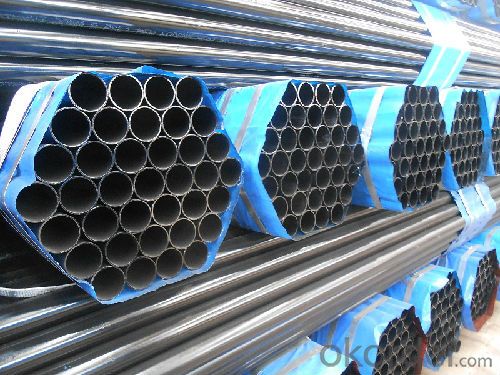
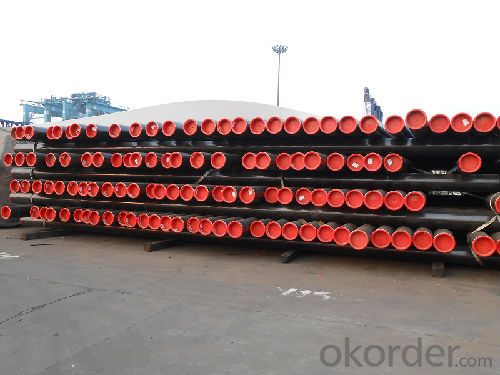
- Q: What are the different methods of transporting steel pipes?
- There are several methods of transporting steel pipes, including by truck, rail, ship, and pipeline. Each method has its advantages and is chosen based on factors such as distance, cost, and accessibility. Trucks are commonly used for shorter distances or when the delivery location is not easily accessible by other means. Rail transport is efficient for long distances and can handle large quantities of steel pipes. Shipping by sea is ideal for international shipments or when the destination is located near a port. Lastly, pipelines are used for transporting steel pipes for oil and gas industries, as they provide a direct and continuous flow.
- Q: What are the different methods of inspecting steel pipes for defects?
- There are several methods for inspecting steel pipes for defects, including visual inspection, ultrasonic testing, magnetic particle inspection, eddy current testing, and radiographic testing.
- Q: How are steel pipes used in the construction of stormwater drainage systems?
- Steel pipes are commonly used in the construction of stormwater drainage systems due to their durability and strength. They serve as underground conduits to efficiently transport stormwater away from built-up areas, preventing flooding and water damage. Steel pipes offer high resistance to external pressure and are capable of withstanding heavy loads, making them suitable for underground installations. Additionally, their corrosion-resistant properties ensure long-term effectiveness and minimize maintenance requirements. Overall, steel pipes are essential components in stormwater drainage systems, providing reliable and efficient water management solutions.
- Q: Can steel pipes be used for underground fire sprinkler systems?
- Yes, steel pipes can be used for underground fire sprinkler systems. Steel pipes are commonly used for their strength and durability, making them suitable for underground installations. However, it is important to ensure that the steel pipes are properly coated or protected against corrosion to maintain their integrity over time.
- Q: What are the different methods of joining steel pipes?
- There are several different methods of joining steel pipes, including threaded connections, weld connections, flanged connections, and grooved connections. Each method has its own advantages and is suited for different applications. Threaded connections involve screwing the pipes together using threads on the ends of the pipes. Weld connections involve fusing the ends of the pipes together through welding. Flanged connections involve using a flange on each end of the pipe and bolting them together. Grooved connections involve using grooves on the ends of the pipes and connecting them with coupling fittings.
- Q: How are steel pipes used in the construction of high-rise buildings?
- Steel pipes are commonly used in the construction of high-rise buildings for various purposes. They are primarily used as structural elements, forming the framework and supporting the weight of the building. Steel pipes provide strength and durability, making them suitable for withstanding the vertical and lateral loads experienced by tall buildings. Additionally, steel pipes are used for plumbing and electrical systems, as well as for heating, ventilation, and air conditioning (HVAC) installations. Their versatility, reliability, and ease of installation make steel pipes an essential component in the construction of high-rise buildings.
- Q: How are steel pipes used in high-rise buildings?
- Steel pipes are used in high-rise buildings for various purposes, including structural support, plumbing, and HVAC systems. They provide the necessary strength and durability to withstand the weight and forces exerted on tall buildings, while also facilitating the efficient distribution of water, gas, and air throughout the entire structure.
- Q: How are steel pipes insulated against heat loss?
- Steel pipes are commonly insulated against heat loss by applying a layer of thermal insulation material around the pipes. This insulation material can be in the form of foam, mineral wool, or fiberglass. The insulation is typically wrapped tightly around the pipes and secured with adhesive or tape to ensure proper coverage. This insulation layer helps to reduce heat transfer through the pipe walls, thereby minimizing heat loss. Additionally, the insulation may be covered with a protective jacket or coating to provide further protection against external elements.
- Q: What is the typical lifespan of steel pipes?
- The typical lifespan of steel pipes can vary depending on various factors such as the quality of the steel used, the environmental conditions, and the maintenance and usage of the pipes. However, on average, steel pipes are known to have a lifespan of around 50 to 100 years. With proper installation, regular inspections, and appropriate maintenance, steel pipes can often exceed this lifespan and provide reliable service for several decades. It is important to note that factors such as corrosion, erosion, and external damage can impact the lifespan of steel pipes, so it is crucial to implement preventive measures and necessary repairs to ensure their longevity.
- Q: How does the price of steel pipes fluctuate?
- The price of steel pipes fluctuates due to various factors, including changes in raw material costs, supply and demand dynamics, global economic conditions, and market competition. Fluctuations in the price of steel, which is a key component in pipe manufacturing, directly impact the cost of steel pipes. Additionally, shifts in demand for steel pipes in industries such as construction, oil and gas, and automotive can also influence their pricing. Market conditions, such as trade policies and geopolitical factors, can further contribute to price fluctuations. Therefore, the price of steel pipes is subject to constant change, driven by a combination of these factors.
Send your message to us
Low carbon seamless steel pipe for boiler
- Loading Port:
- Tianjin
- Payment Terms:
- TT or LC
- Min Order Qty:
- 35 m.t.
- Supply Capability:
- 16000 m.t./month
OKorder Service Pledge
OKorder Financial Service
Similar products
Hot products
Hot Searches
Related keywords
